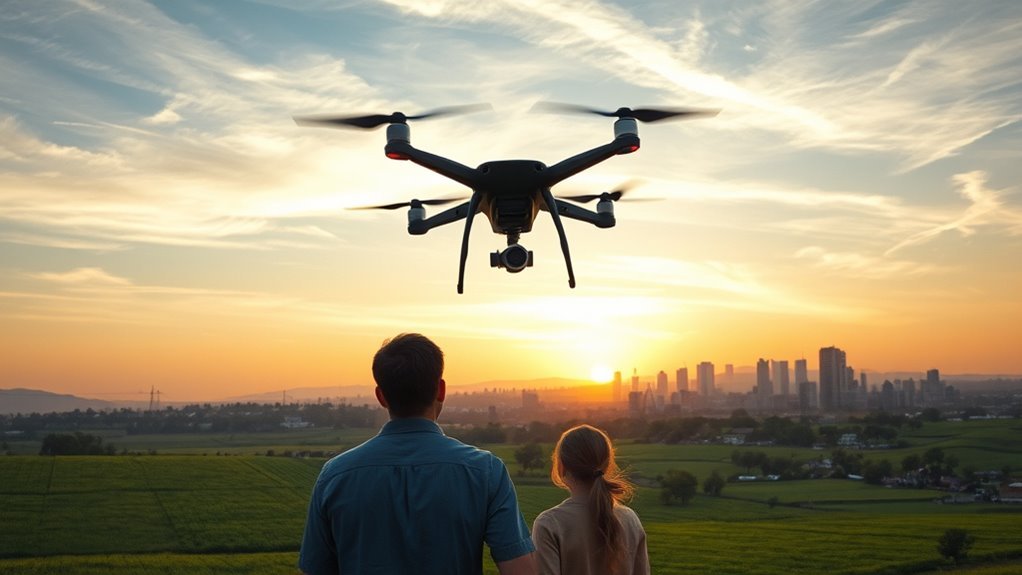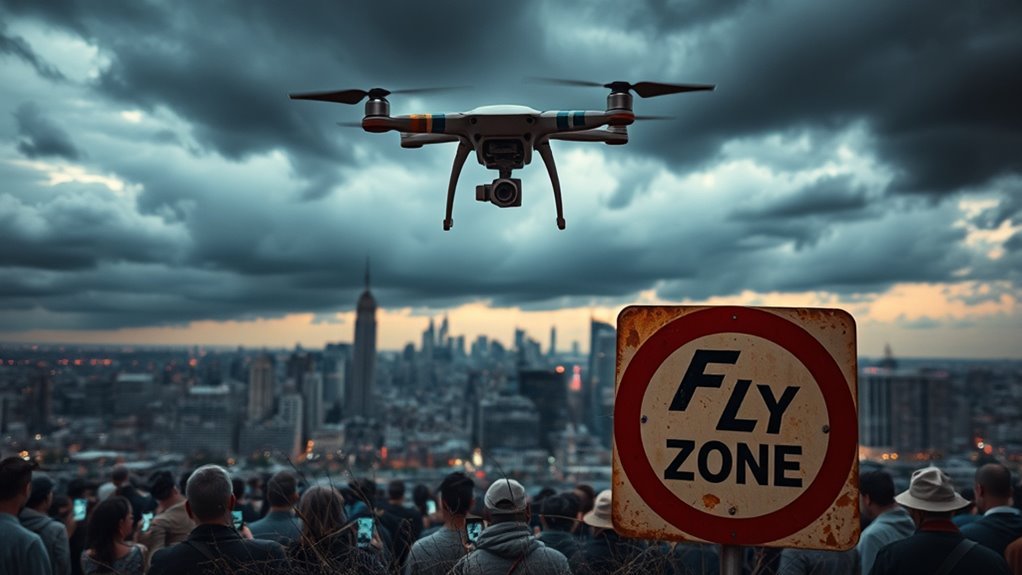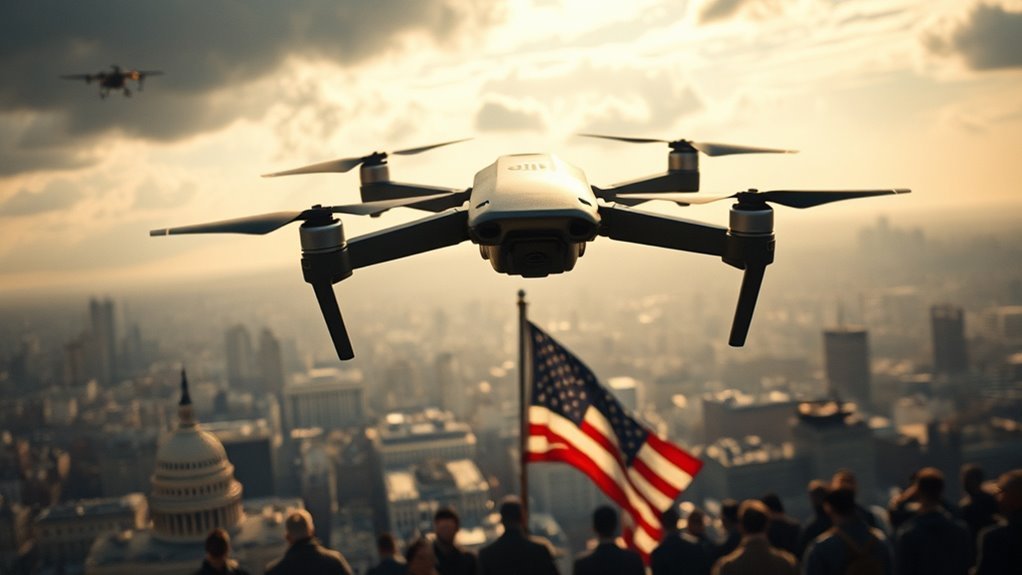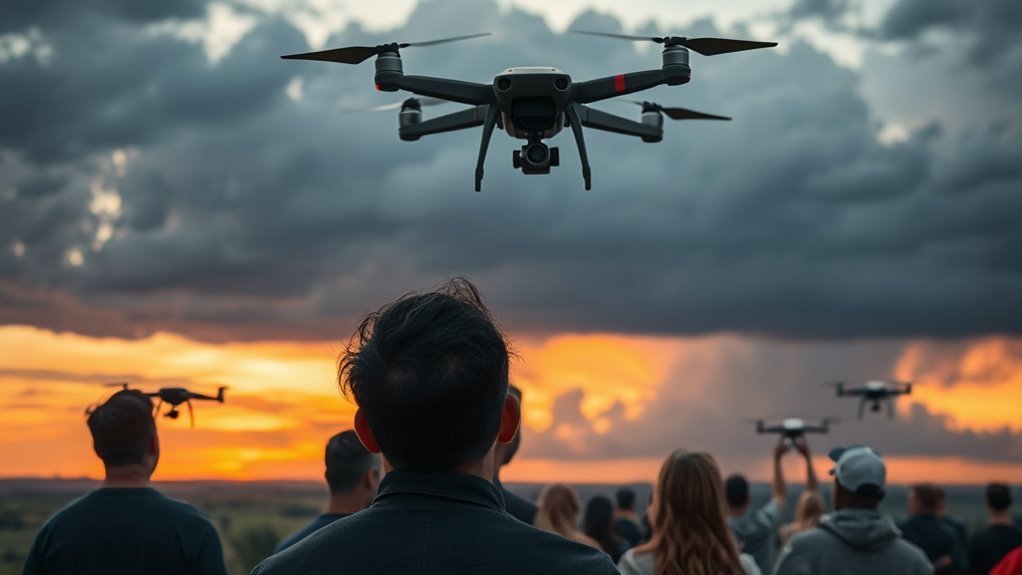DJI drones could face bans in 2025 due to escalating privacy concerns, increasing regulatory scrutiny, and national security threats. Significant data security vulnerabilities persist, while competition from domestic manufacturers pressures DJI to innovate. Public backlash against surveillance technologies and environmental compliance issues further complicate matters. These factors collectively undermine trust and safety perceptions surrounding DJI drones. Discover the intricate relationships between these issues and how they shape the future of drone technology.
Escalating Privacy Concerns

As concerns about privacy continue to grow, the use of DJI drones has come under scrutiny for their potential to infringe on individuals’ rights. You might find it alarming that these drones can capture video and images without consent, raising significant ethical questions about surveillance. Privacy legislation is evolving, yet it often lags behind the rapid development of drone technology. As a result, many feel that current laws fail to safeguard personal freedoms adequately. The ethical implications of using drones for surveillance purposes challenge our understanding of privacy in public spaces. With escalating scrutiny, it’s essential to discuss how these issues intersect with our desire for freedom and the need for robust protections against invasive technologies.
Increased Regulatory Scrutiny

As government oversight expands, the scrutiny on drone manufacturers like DJI intensifies. You’re likely noticing a rise in privacy concerns among regulators, pushing for stricter compliance measures. This increased regulatory environment could markedly impact how DJI operates and the future of drone technology. Furthermore, drone registration and compliance with FAA regulations are becoming critical in ensuring manufacturers meet the evolving legal standards. Additionally, the implementation of geofencing technology is essential for maintaining safe and compliant drone operations in various environments.
Government Oversight Expansion
While the advancement of drone technology has opened new avenues for innovation, it has also prompted increased regulatory scrutiny from governments worldwide. With policy development accelerating, you might find that government intervention is becoming more pronounced. This shift is likely to impact how you use DJI drones, as regulations tighten in response to safety and compliance concerns.
| Regulatory Focus | Implications for Users |
|---|---|
| Safety Standards | Stricter operational limits |
| Airspace Management | Increased flight restrictions |
| Data Security | Enhanced monitoring |
| Licensing Requirements | More paperwork for users |
As these regulations evolve, you may notice more barriers, which could stifle your freedom in enjoying drone technology.
Privacy Concerns Rising
With the rise of drone usage, concerns about privacy have intensified, prompting lawmakers to take a closer look at the implications of aerial surveillance. You’re likely aware that as drones become more prevalent, issues surrounding surveillance ethics are at the forefront of public discourse. Many worry that unchecked drone surveillance could erode consumer trust, leading to a backlash against manufacturers like DJI. This growing regulatory scrutiny aims to guarantee that your rights to privacy aren’t compromised in the name of technological advancement. As lawmakers draft stricter regulations, the balance between innovation and individual freedoms will be tested. Ultimately, how these concerns are addressed will determine whether drones can coexist with the privacy expectations of a free society.
National Security Threats

Given the increasing reliance on drone technology for various applications, concerns about national security threats have intensified, particularly regarding DJI drones. As these devices become more integrated into civilian life, their potential military applications raise alarms. There’s a fear that they could be exploited for foreign espionage, allowing adversaries to gather sensitive information without detection. The ease of access and affordability of DJI drones make them attractive tools for malicious actors. This potential misuse poses a significant risk to national sovereignty and security. As nations grapple with these threats, the call for tighter regulations and possible bans on such drones grows stronger, highlighting the delicate balance between technological advancement and the preservation of freedom and safety. Furthermore, the need for NDAA compliance in drone technology development underscores the importance of safeguarding sensitive data from adversarial influences. Additionally, innovations in US-made drones enhance productivity and reduce operational complexities, reinforcing the perception that domestic options are safer and more secure.
Data Security Vulnerabilities
When using DJI drones, you might face significant data security vulnerabilities that raise privacy concerns. Unauthorized data access can occur if proper security measures aren’t in place, potentially exposing sensitive information. It’s crucial to contemplate these risks before integrating such technology into your operations. Furthermore, the potential for NDAA compliance challenges complicates the security landscape for DJI users. The integration of NDAA-compliant systems can significantly enhance data security and mitigate these vulnerabilities.
Privacy Concerns and Risks
One significant issue surrounding DJI drones is the potential for data security vulnerabilities that can compromise user privacy. As these drones often employ facial recognition technology, they inadvertently contribute to a growing trend of surveillance capitalism, where personal data is collected and exploited. When you operate a DJI drone, you might not realize the extent of the data being gathered, including location and imagery that could be used to track individuals. This raises critical questions about consent and the misuse of your information. The lack of robust data protection measures means your privacy could be at risk, leading to potential exploitation by third parties. As concerns grow, the call for stricter regulations around these drones becomes increasingly urgent.
Unauthorized Data Access
Unauthorized data access poses a significant threat to users of DJI drones, raising alarms about data security vulnerabilities. As drones become more integrated into daily life, the risk of unauthorized access and potential data breaches can’t be ignored. Here are three key concerns:
- User Privacy: Personal information captured during flights can be exposed, compromising your privacy.
- Geolocation Tracking: Sensitive location data might be intercepted, revealing your whereabouts and activities to malicious actors.
- Compromised Flight Data: Unauthorized access to flight logs could lead to misuse, affecting both users and the broader community.
As a user, you should be aware of these risks. Ensuring your drone’s security is essential for protecting your data and maintaining your freedom to operate.
Inadequate Security Measures
The risks associated with unauthorized data access are further compounded by inadequate security measures in DJI drones. User authentication processes often fall short, leaving your personal data vulnerable. Without proper encryption standards, sensitive information can easily be intercepted by malicious actors.
| Security Measure | Current State | Impact on Users |
|---|---|---|
| User Authentication | Weak implementation | High risk of breaches |
| Encryption Standards | Outdated protocols | Data exposure |
| Data Access Control | Lax enforcement | Privacy invasion |
As you navigate the skies with these drones, the lack of robust security can undermine your freedom and trust. It’s essential to recognize these vulnerabilities, as they may lead to stricter regulations and potential bans.
Competition From Domestic Manufacturers
While DJI has long dominated the drone market, increasing competition from domestic manufacturers has prompted concerns about its market share and sustainability. As these local companies rise, they’re harnessing domestic innovation to cater to the specific needs of their local market. This shift could reshape the industry landscape considerably.
Here are three key factors to bear in mind:
- Tailored Solutions: Domestic manufacturers often produce drones that better meet local regulations and preferences. This is particularly relevant as they focus on advanced sensor integration to enhance functionality for specific agricultural needs.
- Cost-Effectiveness: Competitive pricing from local brands can attract budget-conscious consumers.
- Fostering Innovation: Increased competition encourages rapid advancements in technology, pushing all players to improve. For example, gimbal-based stabilization allows newer brands to enhance their camera quality significantly.
If DJI doesn’t adapt, it risks losing its foothold to these emerging rivals.
Public Backlash Against Surveillance
As concerns about privacy grow, public backlash against surveillance technologies—including drones—has intensified. You might find that community awareness is at an all-time high, with citizens increasingly vocal about their discomfort regarding being watched. This sentiment isn’t just a passing trend; it’s a call for citizen engagement in shaping regulations that protect individual freedoms. Many see drones as tools of oppression rather than innovation, fueling fears of constant surveillance. Grassroots movements are rising, demanding transparency and accountability from manufacturers and policymakers alike. This growing resistance could lead to stricter regulations, and ultimately, bans on certain drone technologies like those from DJI. As public sentiment shifts, it’s clear that the fight for privacy is far from over, and drones may be caught in the crossfire.
Environmental Impact and Compliance Issues
Increasing scrutiny on surveillance technologies isn’t just about privacy; it also extends to environmental concerns. DJI drones face growing challenges related to environmental regulations, which could lead to bans in the near future. Here are three key compliance challenges:
Growing environmental scrutiny on DJI drones raises concerns over compliance challenges that could lead to operational restrictions.
- Noise Pollution: Drones contribute to noise levels that disrupt wildlife and natural habitats.
- Carbon Footprint: Manufacturing and operating drones produce emissions that conflict with sustainability goals.
- Waste Management: Drone parts, especially batteries, pose significant disposal issues that violate environmental standards.
Furthermore, the integration of environmental regulations in drone operations could necessitate significant changes in design and manufacturing processes.
As regulations tighten, DJI must navigate these compliance challenges or risk facing restrictions that could limit their operational freedom. The future of drone usage hinges on balancing technological advancements with responsible environmental stewardship.
Frequently Asked Questions
What Specific Regulations Might Be Implemented Against DJI Drones?
Like a watchful guardian, regulations may soon shield your data security and user privacy. Expect strict protocols on data encryption, mandatory reporting of breaches, and limitations on foreign ownership to guarantee your freedom isn’t compromised.
How Will DJI Respond to Potential Bans?
DJI’s likely response to potential bans will involve enhanced public relations strategies and increased consumer outreach. They’ll focus on addressing concerns, promoting safe usage, and emphasizing their commitment to innovation and user freedom in drone technology.
Are Other Drone Brands Facing Similar Scrutiny?
Yes, other drone brands are facing similar scrutiny due to rising drone regulations. As concerns grow, brand comparisons highlight that many manufacturers might encounter challenges, impacting their market presence and innovation opportunities in the evolving landscape.
What Alternatives to DJI Drones Are Available?
If you’re seeking alternative drones, consider competitive brands like Autel, Skydio, and Parrot. These options offer unique features, flexible pricing, and robust performance, ensuring you maintain the creative freedom you desire while flying.
How Can Consumers Protect Their Privacy When Using Drones?
When you’re flying your drone, consider privacy concerns like you would a nosy neighbor. Employ encryption, limit drone surveillance capabilities, and stay informed about regulations to safeguard your personal information and maintain your freedom.

